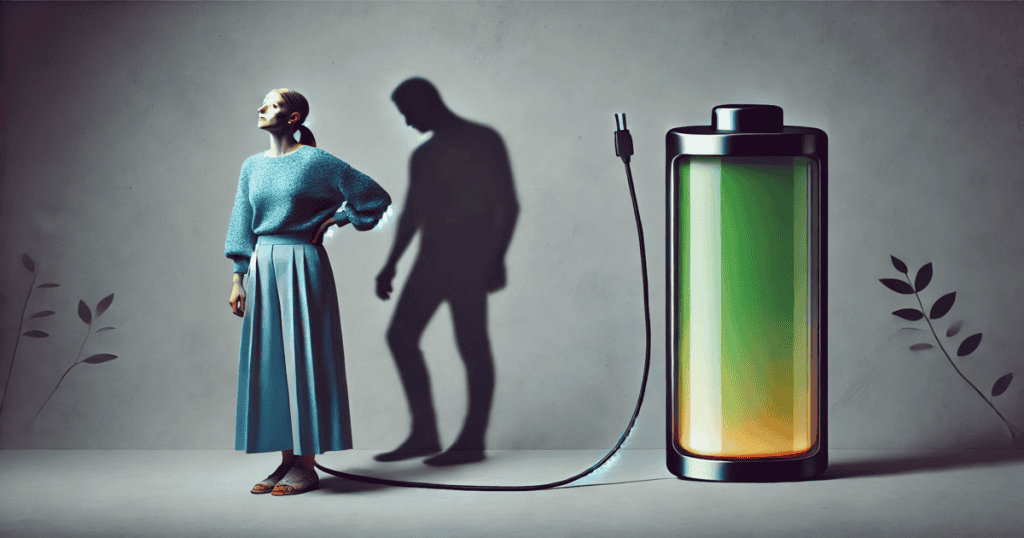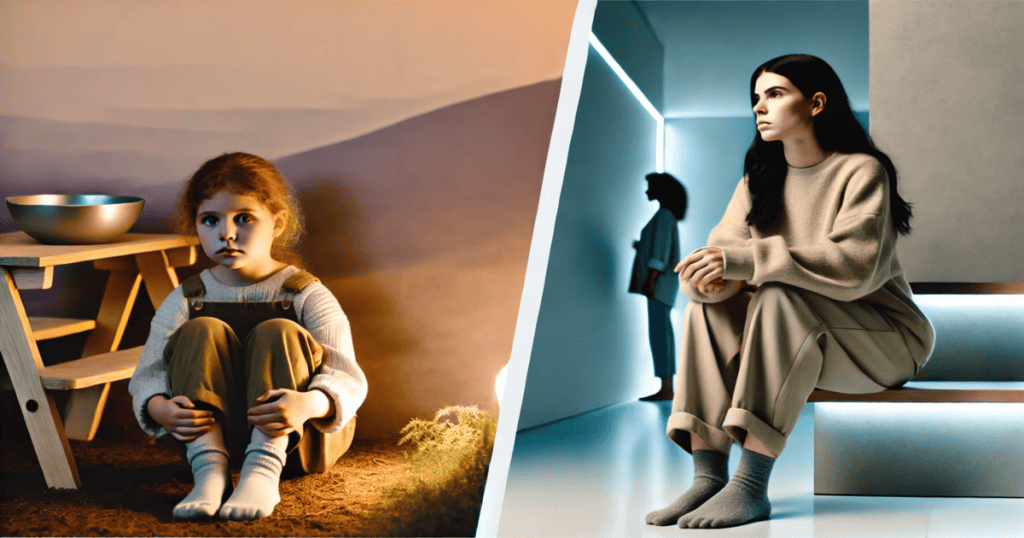Let’s cut the crap, loneliness sucks. It’s that ugly, creeping feeling that shows up when you least expect it, usually right as you’re about to fall asleep or when you’re at a party pretending to enjoy yourself.
But here’s the kicker, loneliness isn’t just about not having people around you. Nope. It’s way more insidious than that. Loneliness often comes from deep, unresolved childhood baggage that you never fully unpacked.
Spoiler alert: that baggage didn’t disappear. It just grew up with you, and now it’s masquerading as adult loneliness.
I know this because I went through it years ago.
See, if you grew up in a home where your feelings were about as welcome as a third wheel on a date, you probably got really good at stuffing them down.
Now, as an adult, you’re dealing with the consequences of that emotional constipation, feeling disconnected, misunderstood, and like you’re always just outside the window looking in on everyone else’s “normal” lives.
And the worst part? You’re stuck in a loop because your brain likes what’s familiar, even when what’s familiar is awful.
Today, I want to dig into why your childhood crap is messing with your adult life and, more importantly, how you can start getting unstuck. Because let’s be real, no one wants to stay in this loneliness cycle forever.
- Adult loneliness often stems from unresolved childhood trauma, particularly emotional neglect or unmet needs.
- We unconsciously repeat harmful emotional patterns because our brains are wired to stick with what’s familiar, even if it’s unhealthy.
- Breaking the cycle of loneliness starts with recognizing these patterns and making small, intentional changes to rewire your emotional habits.
Table of Contents
Why Adult Loneliness Is Tied to Your Childhood Trauma?
You know those lonely moments as a kid, sitting in your room, feeling like no one truly “gets” you? Yeah, those don’t just vanish into thin air. They hang around like a bad smell and evolve into that adult loneliness you keep bumping into.
As a kid growing up with my toxic, unloving, and supporting mother, I didn’t get the emotional support that I needed. I started to believe that my feelings don’t matter. And, boom, there’s the seed that grows into my disconnected adult self.
Fast forward to adulthood, and I found myself in a room full of people, but I still felt like I was on the outside looking in.
You know what I’m talking about, right? It’s like no matter how many people are around, you’re still isolated. That’s the lingering effect of a childhood where your emotions weren’t validated, and now you’re stuck on repeat, living out that same emotional disconnection.
1. Feeling Like a Weirdo in a Room Full of Normals

You know the drill. You’re at a party or work event, people are laughing, clinking glasses, talking about who-knows-what, and you’re standing there thinking, “What the hell am I even doing here?”
It’s like everyone else got the memo on how to fit in, and you’re still fumbling around like a lost tourist.
That feeling of being the odd one out didn’t start yesterday. It started way back when you were a kid, maybe sitting alone during recess, wondering why you never quite fit in.
The truth is, when you grow up feeling emotionally disconnected, it becomes second nature to keep people at arm’s length—even when you desperately want to connect.
So now, as an adult, you’re still playing the same game, convinced that nobody really gets you. Newsflash: they won’t unless you let them in.
2. Chasing Gold Stars Like Your Life Depends on It

Okay, real talk, how many times today did you check your phone for likes, comments, or that sweet, sweet email from your boss praising your hard work? Be honest. We all do it.
It’s like we’re chasing gold stars as if our lives depend on them. And hey, validation feels great—until it doesn’t.
Here’s the thing: when you didn’t get enough emotional affirmation as a kid, you grow up constantly searching for it in other places.
You’re that person who needs the thumbs-up, whether it’s from a partner, your boss, or even that stranger who just complimented your shoes.
The problem? That kind of validation is fleeting. It’s like putting a band-aid on a broken leg—it covers things up for a while, but the problem is still there, festering away. You can’t fill that void with external praise; you have to start building yourself up from the inside.
And yeah, I know that sounds cheesy as hell, but it’s true.
3. Mastering the Art of the Vanishing Act

Ever notice how you have this magical ability to disappear from social situations the minute you feel even a little uncomfortable?
You’re basically Houdini, but instead of disappearing in a puff of smoke, you slip out the door with some lame excuse like “I have to get up early tomorrow.”
Look, I get it. When you’re not feeling your best, the last thing you want is to stick around and pretend everything’s fine. But here’s the problem with your disappearing act: it’s a defense mechanism rooted in your childhood.
When you felt overwhelmed as a kid, you probably learned that the easiest way to cope was to withdraw. And now, as an adult, you’re still running that same script.
But here’s a wild idea, what if you didn’t? What if you stayed in the room, even when it’s uncomfortable, and gave yourself the chance to connect with people who might actually be good for you?
4. Attracted to People Who Drain Your Energy

If your relationship history is a dumpster fire, welcome to the club. You’re not alone. I was there once and thanks the lord, I’m out.
A lot of us who grew up without emotional validation end up in relationships with people who suck the life out of us. Why? Because it’s familiar.
You’re used to being the one who gives and gives while the other person takes and takes until you’re left feeling emotionally bankrupt.
You might not even realize you’re doing it, but you keep attracting people who reinforce the same loneliness you felt as a kid. It’s like your brain is stuck on autopilot, picking partners who are emotionally unavailable because that’s what feels “normal” to you.
The good news? Once you recognize the pattern, you can start to break it. You don’t have to keep dating emotional vampires.
You deserve better, but you have to believe it first.
5. Avoiding Your Feelings Like It’s a Full-Time Job

I have to be honest with you here, sometimes it’s just easier to keep busy than to sit with your feelings.
You throw yourself into work, hobbies, or endless hours of Netflix because the alternative, actually dealing with your emotions is terrifying. So you avoid it like it’s some kind of dangerous game of emotional dodgeball.
But here’s the deal: no matter how much you try to distract yourself, those feelings of loneliness and emptiness have a way of catching up to you.
You might be able to outrun them for a while, but eventually, they’ll trip you up and leave you face-first in a puddle of anxiety or depression.
The only way out is through. You have to stop running and start dealing with the mess inside. It’s not easy, and it sure as hell isn’t fun, but it’s necessary.
Why We Keep Repeating These Toxic Patterns?
So, why the hell do we keep doing this to ourselves? Why do we keep finding ourselves in the same crappy situations, feeling the same soul-crushing loneliness over and over again?
Simple. Our brains love what’s familiar. It’s like a bad movie we’ve seen a thousand times, sure, it sucks, but at least we know how it ends.
The trick is to break the cycle. And that starts with awareness. Once you know why you’re stuck, you can start making different choices.
It’s not about changing overnight. It’s about recognizing the patterns and consciously choosing to do something different, one small step at a time.
Here’s How You Can Get Unstuck
Alright, let’s get practical. How do you break free from this loneliness loop?
First, start noticing when you’re falling into these old habits.
Catch yourself when you’re seeking validation from others or when you’re about to disappear from a social event. Ask yourself: is this helping me, or am I just doing what I’ve always done because it feels safe?
Then, do the hard thing. Stay in that uncomfortable situation a little longer.
Open up to someone, even if it feels scary. Little by little, you’ll start to break those patterns, and with time, you’ll realize that you don’t have to keep living in this loneliness trap.
Related Posts:
- 10 Signs Abandonment Trauma Is Sabotaging Your Relationships
- 8 Typical Trauma Responses You’ll Face After Narcissistic Abuse
- 7 Patterns Resilient People Have After Healing From Narcissist Trauma
- Daughter of a Narcissistic Mother: How I Rise Beyond Trauma
- How I Rise Beyond Trauma While Dealing with a Narcissistic Mother
Frequently Asked Questions
What causes adult loneliness?
Adult loneliness often stems from unresolved childhood trauma and emotional neglect.
How does childhood trauma affect relationships?
Childhood trauma can lead to repeating harmful emotional patterns, like attracting emotionally unavailable people.
Why do I feel like an outsider even when I’m around people?
This feeling often comes from deep-seated emotional disconnection linked to childhood experiences.
Can I break free from these emotional patterns?
Yes, by recognizing the patterns and making small, consistent changes, you can break the cycle.
How do I stop seeking validation from others?
Start by building self-worth from within and gradually reducing reliance on external validation.


